PPC vs. SEO.... The Title Match!
Ladies and Gentlemen…. For the thousands reading blogs, and the millions & MILLIONS surfing the...


 Pay-per-click, or its more popular abbreviation PPC, is a form of sponsored internet marketing in which advertisers only pay when one of their ads is clicked. It is a great way to generate traffic to your website and works best for a highly targeted audience for a limited amount of time. However, if not done properly, it can be a vacuum for advertising budgets. If poorly managed, you could spend a ton of money for a ton of visits, but very few sales. So, for every yin, there’s a yang. As with everything, there is both good and bad to PPC advertising – we’ll look at both.
Pay-per-click, or its more popular abbreviation PPC, is a form of sponsored internet marketing in which advertisers only pay when one of their ads is clicked. It is a great way to generate traffic to your website and works best for a highly targeted audience for a limited amount of time. However, if not done properly, it can be a vacuum for advertising budgets. If poorly managed, you could spend a ton of money for a ton of visits, but very few sales. So, for every yin, there’s a yang. As with everything, there is both good and bad to PPC advertising – we’ll look at both.
How Does Pay-Per-Click Work?
Today, search engine PPC is the most popular form of advertising and the one we will focus on here. PPC is a quick way of buying your way to the top of the Search Engine Results Page (SERP) for a specific keyword, rather than slowly earning your position naturally. These bought listings appear just above or to the right of the non-paid, organic, search results, and are usually tagged as sponsored.

You can think of Pay-Per-Click advertising as a silent auction for results placement. You bid what you want to pay for ad placement in the search results for specific keywords or phrases (long-tailed keywords). When those keywords are searched for there’s a chance you’ll show up at the top of the sponsored list, depending on your competitors’ bids and other factors. Then, every time your ad is clicked, sending a visitor to your website, you pay the search engine whatever your final bid was.
So, if you bid $1 per click (get it?) and you’re the highest bidder, you’ll probably be at the top of the sponsored listing. If your ad is clicked on 100 times in a month, the search engine will charge you $100 for that month. When PPC advertising is working correctly, the fee is trivial. Using the previous example, if you pay $1 per click, and that click results in a $200 sale, then you’ve made a decent profit and your PPC venture is worthwhile. Simple…. right?
It takes a lot to launch and maintain a successful Pay-Per-Click campaign: 1) You need to research and select the right keywords and/or phrases; 2) You have to organize those keywords and phrases into relevant advertising campaigns and groups; 3) You need appropriate PPC landing pages that are optimized to convert clicks – you shouldn’t send everyone to your homepage. Search engines like Google charge less per click to those campaigns that are intelligently targeted and have ads & landing pages that are useful and satisfying to their users. So if you start using PPC, this is what your goal should be. Proper research and preparation can directly lead to higher profits for your business. But, if not done right….
Downside of PPC
Of course there’s a downside. If there wasn’t then everyone would be #1 for all searches performed on the world-wide-web – which is impossible. So let’s take a look at some of the pitfalls of Pay-Per-Click.
Junk Traffic – If you outsource your PPC campaign, many services are distributed to their partners and networks, besides the search engines. So, while you may be generating traffic from Google & Bing, you may also be getting blind clicks from areas of the web that have nothing to do with your product or service. This will look good in your statistical reports, but will not convert to sales.
No Pay Scale – Simply put, the more clicks (see above) you get, the more you pay. The cost of each click remains constant, as your overall cost increases.
(Un) Educated Users – Some studies show that the more educated a user is, the less likely they are to click on the sponsored links. Know your target audience before you jump into a PPC campaign. If your targeting doctors or engineers, you may want to re-think your strategy
Your Boss’s Ego – If your boss decides that you must be at the top of certain search results no matter what, you could very well get into a bidding war with your competitors – inflating the cost-per-click, and blowing the budget.
Search Engines – Search engines are advertising companies. They are there to make money just like you. So, while you think they are helping you, their endgame is to help themselves. Their prices are reflective of quality restrictions on certain keywords and market demand.
Advertising is expensive, and a high return on investment (ROI) is the goal. Be sure to cover all your bases before your invest in Pay-Per-Click. Don’t waste your budget by getting caught in a bidding war for results that won’t convert to sales.
Upside of PPC
There is an upside too. Otherwise, I wouldn’t be writing this piece, and you wouldn’t be reading it. Pay-Per-Click can be a highly profitable endeavor for the right product/service under the right circumstances.
It’s Fast – A PPC campaign can generate a lot of traffic right away. You can be up and running and see results immediately. Spend enough, get top placement, and customers see you first – time for clicks.
Flexibility – Most PPC campaigns can be changed to match customer trends and market conditions within hours or days. Compare that to organic search engine optimization (SEO) and traditional advertising which can lag behind weeks or even months.
Landing Pages – You can create custom landing pages, or at least directly properly, for ad clicks. The right page can translate into higher conversion rates.
Bargains – They are out there to be had. You can start with a small amount of money, and experiment cheaply to discover what works best for your business – then you can expand. Also, test out niche keywords, sometimes you get lucky, and you can grow an entire campaign for next to nothing.
If these points fit in with your business’s strategy, then PPC might be right for you. Just be sure to research the specific pros/cons for your company, and even do a little experimenting, before you commit totally. You may find that you don’t need to use Pay-Per-Click for your products or services to get the highest ROI from search engines.
PPC search engine advertising can provide a level playing field for small startups to compete with larger established companies. But, it may not always be the right move at the right time. Be sure you do as much research as possible. Research your competitors. Research your customers. Research your target audience. Research your keywords and phrases. Research doing-it-yourself versus a service. Research prices and bidding. If you’re willing do the work, then you should get the results you desire.
If you’re interested in starting a Pay-Per-Click campaign today, contact Avanti Vision to get started. If you’re still unsure and would like to read more, see PPC v. SEO.

Get Ahead, Stay Ahead Marketing


Ladies and Gentlemen…. For the thousands reading blogs, and the millions & MILLIONS surfing the...


Though that's a bold title, it may not be as crazy as it sounds. Millions of people search online...
Leave a Comment